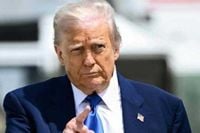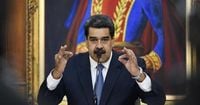Helicopters from the U.S. Army’s 160th Special Operations Aviation Regiment, better known as the “Night Stalkers,” have been spotted flying just 145 kilometers off Venezuela’s northern coast, stirring speculation about a possible Special Forces operation in the region. According to The Washington Post, these flights—featuring the regiment’s signature MH-60M Black Hawk, MH-6M Little Bird, and MH-47G Chinook helicopters—come on the heels of new covert action authorizations for the CIA, approved by U.S. President Donald Trump. The sight of these elite helicopters so close to Venezuelan airspace has set off alarms and accusations in Caracas, as well as heated debate in Washington and beyond.
The 160th SOAR, headquartered at Fort Campbell, Kentucky, is the Army’s premier special operations aviation unit. Their main job? Providing precision, low-visibility support to America’s most elite military and intelligence teams, including the 1st Special Forces Command, the 75th Ranger Regiment, Delta Force, Navy SEALs, Marine Raiders, and the CIA’s Special Activities Center. The Night Stalkers became a household name after their pivotal role in the 2011 Abbottabad raid that led to the death of Osama bin Laden—slipping into Pakistani airspace undetected, inserting SEAL Team 6, and pulling off a high-stakes exfiltration without conventional backup. As Army Recognition notes, the regiment’s current presence near Venezuela draws strong parallels to that legendary mission, suggesting the U.S. is preparing for operations that require speed, deniability, and surgical precision.
The helicopters observed are no ordinary machines. The MH-47G Chinook, for example, can insert troops up to 1,100 kilometers from launch points like seaborne platforms, and is loaded with advanced radar, infrared suppression, and electronic countermeasures. The MH-6M Little Bird is designed for tight landings in urban or jungle settings—perfect for quickly dropping Special Forces into high-threat zones under the cover of darkness. These capabilities, combined with the Night Stalkers’ reputation for flying just meters above ground level to avoid detection, make the 160th SOAR the go-to unit for the most politically sensitive missions.
So why is the U.S. military massing such firepower near Venezuela now? The answer, at least in part, lies in President Trump’s recent statements. On October 16, 2025, Trump confirmed he had authorized the CIA to conduct covert operations in Venezuela. Speaking to reporters at the White House, he accused the Venezuelan government of “emptying their prisons into the United States of America,” and of “allowing thousands and thousands of prisoners and people from mental institutions, insane asylums” to cross the border—though he offered no evidence for these claims, as reported by China Daily and CNN. Trump also tied the new CIA authorization to U.S. efforts to stop drug smuggling from Venezuela by both sea and land, saying, “We have a lot of drugs coming in from Venezuela, and a lot of the Venezuelan drugs come in through the sea, so you get to see that, but we’re going to stop them by land also.”
Pressed by reporters on whether he had authorized the CIA to kill Venezuelan President Nicolas Maduro, Trump refused to answer directly, saying only, “I think Venezuela is feeling heat.” He added that his administration is “certainly looking at land now because we’ve got the sea very well under control.” According to The New York Times, the new CIA mandate authorizes lethal missions in Venezuela and the Caribbean, as well as coordination with broader U.S. military operations in the region. Since September, the U.S. has launched at least five strikes on what it claims were drug-trafficking boats near Venezuela, killing 27 people in total. The U.S. military presence in the Caribbean now includes roughly 10,000 troops, eight warships, and a submarine, with most forces based in Puerto Rico.
The deployment of the Night Stalkers, combined with CIA covert action, signals a hybrid U.S. strategy: using intelligence-led operations and elite aviation to shape outcomes in Venezuela without escalating to full-scale war. Such missions could include precision raids, hostage rescues, sabotage, or human intelligence exfiltration—classic tasks for Special Forces and Delta Force, as outlined by Army Recognition. The deep partnership between the 160th SOAR and U.S. Army Special Forces is key, enabling real-time air-ground coordination and rapid adaptation to threats. Special Forces teams regularly rehearse with Night Stalker pilots, practicing everything from fast-roping to complex extractions under fire.
Venezuela, for its part, is not taking these developments lightly. President Maduro has condemned the U.S. actions as “coups d’etat orchestrated by the CIA” and a violation of international law. In a statement released by Foreign Minister Yvan Gil, Venezuela said it would raise a formal complaint at the United Nations Security Council, demanding accountability from the U.S. government. Maduro, speaking on national television, decried what he called “discriminatory and xenophobic statements” from Washington and called for peace, not war. Meanwhile, Venezuela’s military has repositioned its Russian-made Buk-M2E and Pechora-2M surface-to-air missile systems around key government and military sites, and stepped up electronic warfare efforts along the coast to detect low-flying helicopters. However, as Army Recognition points out, these measures may not be enough to counter the 160th SOAR’s low-altitude, terrain-hugging tactics.
Reactions in Washington have been mixed. Some Democrats have questioned the legality and oversight of Trump’s expanded CIA and military actions, with Senator Peter Welch of Vermont telling CNN, “We have asked for, what’s the legal basis upon which you’re doing this? No answer. So what you have is a situation where the chief executive is making a decision on his own, without any oversight, without any accountability about who gets killed. And that’s not an acceptable situation.” Republican Senator Jim Risch, however, defended Trump’s approach, saying he is “doing exactly what he should be doing.”
Venezuelan opposition leader María Corina Machado, who recently won the Nobel Peace Prize, has taken a different tack—calling for more U.S. support to help unseat Maduro, whom she described as leading a “criminal narco-terrorism structure.” In an interview with CNN, Machado echoed the Trump administration’s tough stance, asking for greater “help” in removing Maduro from power.
Meanwhile, the U.S. campaign against drug trafficking in the region has reportedly widened, with at least one strike targeting Colombian nationals on a boat that had left from Colombia, suggesting the scope of operations may be broader than previously acknowledged.
As the Night Stalkers remain poised off Venezuela’s coast, the world is left to wonder: Is this the prelude to a major U.S. special operations mission, or a high-stakes game of brinkmanship? What’s clear is that Washington is betting on a blend of covert action and elite military muscle to achieve its goals in Venezuela—while Caracas braces for whatever comes next.






